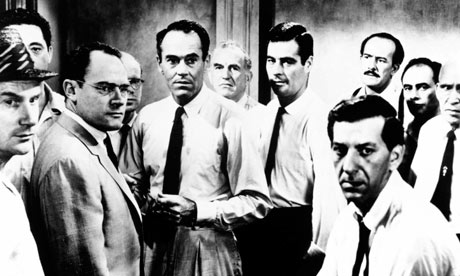
Allowing television cameras inside English and Welsh law courts might be a good thing for democratic transparency, but in entertainment terms, it'll be a disaster. On the one hand it will reveal the gaping chasm between legal dramas like Damages or Anatomy of a Murder and the mundane reality of some old duffer in a wig droning on interminably. Worse still is the prospect of that extra limelight encouraging our proud legal system to amp up its performance aspects.
So brace yourself, magistrates, for a sudden rash of mavericks operating out of their cars (Matthew McConaughey in The Lincoln Lawyer), ditzy prosecutors using the courtroom as a catwalk (Reese Witherspoon in Legally Blonde), or macho barristers chewing the oak panelling (Al Pacino in … And Justice For All, The Devil's Advocate, you name it).
If we're lucky, we'll get some reenactments of cultural courtroom moments. Perhaps a group rendition of Plan B's She Said video, or a self-cross examination like Woody Allen did in Bananas. And no martyrdom-inclined defendant should take the stand without studying the agonised Maria Falconetti in Dreyer's The Passion of Joan of Arc. It's only a matter of time, though, before someone slams their hand down on the bench and shouts: "You can't handle the truth!", A Few Good Men-style. The smart money's on Rupert Murdoch doing it during the Leveson inquiry.
But perhaps culture can, and has, improved the judicial process. Jury members might be less timid for having seen Twelve Angry Men, or lawyers more measured and principled for having read To Kill a Mockingbird. In literary terms, Dickens's Bleak House or Kafka's The Trial might have guided the way to a more enlightened legal system. If all goes well, we can expect gripping, eloquent, real-time meditations on the quality of mercy (The Merchant of Venice), free speech (The People Vs Larry Flynt), and church and state (A Man for All Seasons). Or at least an am-dram John Grisham thriller.
In reality, though, the most likely outcome is an English version of Judge Judy – an endless succession of petty domestic squabbles, taken by all involved as an opportunity to launch their own celebrity career. So let's hope it's boring as hell, otherwise we'll have people committing crimes just to become reality TV stars.

